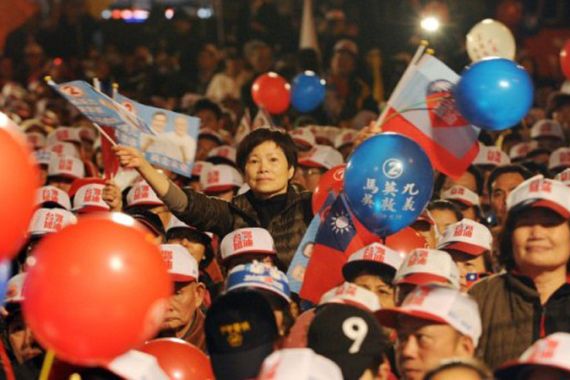Taiwan readies for tight presidential vote
Campaigning ends ahead of Saturday poll pitting China-friendly incumbent against rival wary of closer ties with Beijing.

 |
| Candidate Tsai Ing-wen, who studied at the London School of Economics, would be nation’s first female president [AFP] |
Taiwan’s presidential candidates have wound up a packed last day of campaigning in an attempt to lure voters who will decide the outcome of a tight race watched intensely in Beijing and Washington.
The choice in Saturday’s vote is essentially between the incumbent Ma Ying-jeou, who has overseen four years of improved ties with China, and his main challenger Tsai Ing-wen, a skeptic on closer mainland relations.
Amid swirling campaign banners and cheering crowds, Ma and Tsai, of the Democratic Progressive Party (DPP), crisscrossed the island ahead of a contest that pits Ma’s experience against Tsai’s populism.
Opinion surveys published a week ago, the last permitted under Taiwanese law, showed Ma clinging to a slim three to four percentage point lead that was within the statistical margin of error, despite Tsai never having won an election for public office in Taiwan.
Legislative elections being held at the same time are likely to see Ma’s Nationalists retain a majority in the 113-seat house, although with a diminished margin.
Washington watches
Security was tight around candidates on Friday, as officials were anxious to avoid a repeat of an election-eve shooting that wounded then-president Chen Shui-bian and his deputy in 2004.
Police quickly subdued a woman in her 30s after she started waving a knife around outside Tsai’s campaign office in central Taipei. No one was hurt, according to police, who did not give a motive for the woman’s behaviour.
With presidential elections looming in the US, and a power transition underway in China, both Washington and Beijing will be keeping a close eye on the poll in Taiwan, which has been a traditional trouble spot between the two powers.
Taiwan has governed itself since 1949, but China claims it as part of its territory, and has never ruled out the use of force to bring about reunification.
“The chance to change the future is in our hands tomorrow,” said Tsai, who has a doctorate from the London School of Economics and is vying to become the island’s first female president.
The 55 year old, who has reportedly caused concern in Washington over her views on relations with China, promised stable ties with Beijing as she rode an open-top jeep to canvass voters in the northern city of Keelung.
Economic impact
Ma, meanwhile, covered large parts of the island, including the south, where his ruling Kuomintang (KMT) party faces an uphill struggle.
“Since the KMT assumed power, ties across the Taiwan Straits have improved … and the economy is getting better and better,” he told a crowd in the southern city of Kaohsiung, a hotbed of DPP support.
Ma is campaigning on his record, since assuming power in 2008, of swiftly improving ties with China, culminating with a sweeping trade pact signed one and a half years ago.
His candidacy got a boost on Friday when 127 executives, many based in the north’s Hsinchu Science-based Industrial Park, the island’s “Silicon Valley”, placed an advertisement in the Apple Daily and Liberty Times giving him their backing.
The notice called on voters to support the so-called “1992 consensus”, a vague formula under which Beijing and Taipei both agree there is only one China, but each side maintains its own definition of what that means.
Al Jazeera’s Steve Chao, reporting from Taipei, said: “What’s at stake is the future of Taiwan’s course with China, perhaps not just the next few years, but for many decades to come”.
An extra factor of uncertainty in this year’s election is the candidacy of James Soong, a former KMT heavyweight, who has minimal chance of winning but could take crucial votes away from Ma.